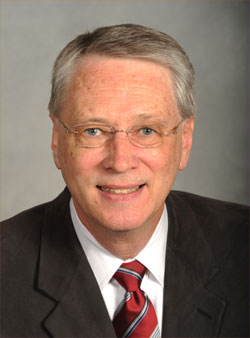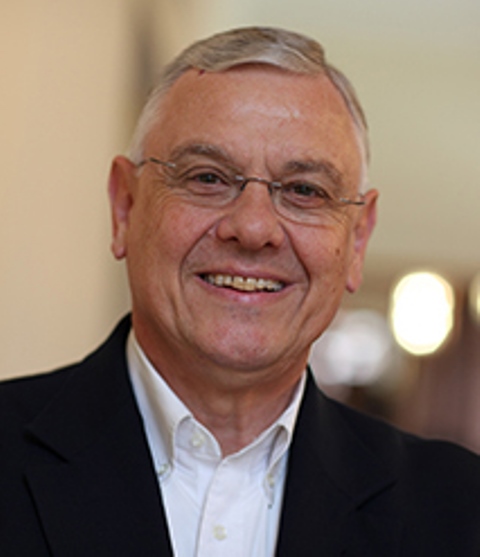By Jeff Brumley
Brian McLaren is recognized as one of the most influential shapers of progressive Christian thought and has revolutionized the way many conceive and practice evangelism, church planting, worship and spiritual formation.
Yet McLaren, who is closely associated with the Emergent church movement, has done all that with a master’s degree in literature, some college English teaching and a few years pastoring a non-denominational church.
So, is McLaren proof that advanced doctorates are useless for pastors in an emergent and missional Christian world?
Not according to McLaren.
“The first thing I say — even though I don’t have a traditional seminary degree — is that I am very pro-seminary,” he said, adding that he has served on two seminary boards.
The variety of church and ministry environments out there today often demands some form of advanced education — theological or otherwise — for ministers, he added.
“Christian ministry is not one thing, but many different things.”
Debate over how educated clergy should or shouldn’t be isn’t anything new, but it has gained steam in an age of plummeting church attendance, declining religious literacy and rising tuition costs.
Predictions that the established, institutional church is dying leads some to believe that Ph.Ds and doctors of ministry will — and should — suffer the same fate.
Others are more circumspect, arguing instead that the issue just needs a dose of common sense.
‘How uneducated’
Mark Wingfield, associate pastor at Wilshire Baptist Church in Dallas, said the rubber hits the road for this issue when congregations conduct pastor searches.
Wingfield stirred conversation with an October blog post challenging the assumption that a doctorate degree is always a good thing for pastors to have.
He told of a pastor search committee at a medium-sized church desiring “above all that their next pastor have the title ‘Dr.’ in front of his name, and found himself thinking, “how uneducated.”

Many churches with that requirement fail to realize the challenges that come with that prerequisite — such as candidates with doctorates usually require higher salaries due to student-loan debt, said Wingfield.
The issue arises at Wilshire Baptist, too, when participants in its pastoral residency program struggle to find jobs.
“They go out, and they are looking for a pastorate, and they consistently run into barriers with search committees saying you are too young or we really want somebody with a doctorate,” Wingfield told ABPnews.
Wingfield, who does not have an advanced theological degree, added that he’s not anti-doctorate, but urges congregations to think through such requirements.
“I think churches also need to take into account experience in addition to whatever degree,” he said. “Because you can have a (master or doctoral) degree and have no meaningful experience.”
‘Will it fit in your context?’
That’s a consideration Brian Foreman has urged search committees to consider when hiring new ministers.
“I might ask, is it contextually appropriate — will it fit in your context?” said Foreman, a Raleigh-based youth ministry and social media consultant and adjunct professor at Campbell University.
A Ph.D, say, would make sense at a church in a university town where the membership has a high percentage of educators and others with doctorates, Foreman said.

In other situations, looking good is the motivation for seeking someone with advanced education, Foreman said.
“The church down the road has a pastor with a doctorate, then we should have a pastor with a doctorate,” he said. “If it’s a pride thing for the church, then you have to question the motivation behind that.”
But Foreman also guessed the issue is likely to diminish as Millennials gain prominence in the church.
Instead, the missional and other ways of doing church that are trying to engage younger Americans will need leaders who are entrepreneurs more than clergy steeped in theology and homiletics.
“To younger generations, it’s less and less important that their pastors have an earned doctorate,” Foreman said. “I don’t see younger generations caring as much.”
But universities and seminaries aren’t throwing in the towel, and predict a continuing demand in some quarters for pastors capable of connecting the dots between theology and the pressing issues of life.
It’s one of the reasons Mercer University is planning to launch a Ph.D program in Baptist studies, said Daniel Vestal, a professor and director of Mercer’s Eula Mae and John Baugh Center for Baptist Leadership.
“We believe it’s important for education and for the future of the church,” said Vestal.

Vestal agrees the number of churches requiring doctorates is declining, but at the same time there are a growing number of Baptists and others who are leading in non-pulpit settings — nonprofit groups, denominations and mission organizations — where specialized knowledge and skill sets are useful.
“I think it’s also important because the gospel intersects with real intellectual issues and problems — the meaning of life, the meaning of history, the problem of evil,” he said. “Learning is tied to that.”
Some seminaries see the doctor of ministry, as opposed to the more academic Ph.D, as the ideal way to provide clergy with advanced training and education, said Ron Cook, director of the doctor of ministry program at Baylor University’s Truett Theological Seminary.
That’s the only kind of doctorate Truett offers, and even then only to pastors with at least three years of experience and currently working in ministry.

Such programs provide clergy a chance to step back and delve deep into some aspect of ministry that inspires them and is useful to their congregations, Cook said.
“It’s theological reflection in a completely different framework because they are reflecting on the crisis of ministry and on the complexities of ministry,” Cook said.
But Cook stopped short of predicting the future for doctorates in the ministry or what those degree programs will look like, citing the changing nature of ministry and congregational life.
“The trend toward being more missional and the way churches are being formed really does require new skill sets, so I am not sure,” Cook said.
Ministry more complex
Baptists are more likely than other Protestant faiths to witness the ongoing decline in advanced theological education, said Daniel O. Aleshire, executive director of the Pittsburgh-based Association of Theological Schools.
Ph.Ds historically were most prevalent among Southern Baptist and Cooperative Baptist ministers who attended SBC seminaries where the degrees were encouraged and provided at very low — or no — cost, he said.
“You would not find the same phenomenon among Methodist or Lutheran or Episcopalian” clergy, Aleshire said.
While the number of Baptist preachers getting doctorates is declining as in other traditions, Aleshire said he doesn’t expect the practice to disappear. In fact, he said, more seminaries are now offering doctor of ministry degrees in missional ministry and theology.
“Ministry is getting more complex, far more difficult than it was, and a number of pastors have used these degrees to equip themselves for this work,” he said.
Seminaries in general seem to be doing a much better job of keeping pace with change than many congregations are, McLaren said.
A congregation “in a state of denial” and wanting to preserve a 1950s or 1970s style of Christianity may have a difficult time adjusting to trends, regardless of their pastor’s education.
But even in leading a cutting-edge church, a pastor may find the critical thinking skills honed in doctoral study useful. In other cases, maybe not.
“I wouldn’t want to make a false dichotomy between no training and advanced training,” said McLaren.
